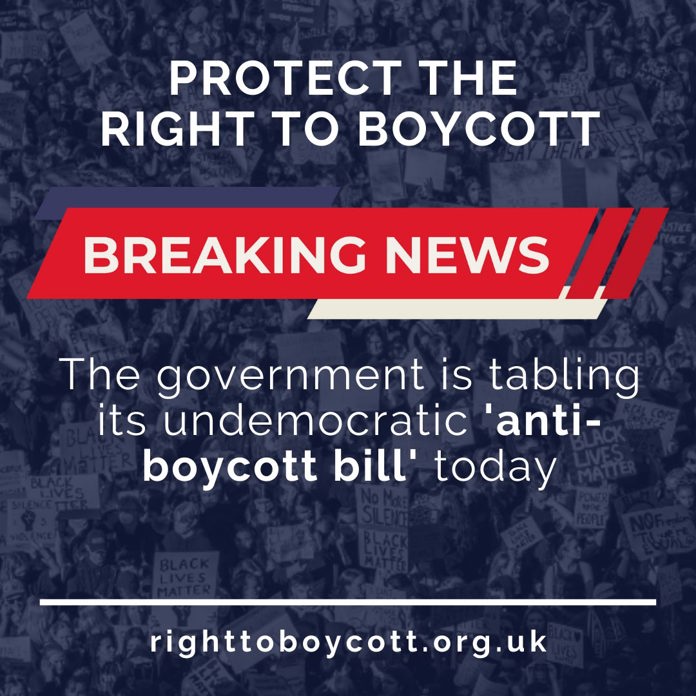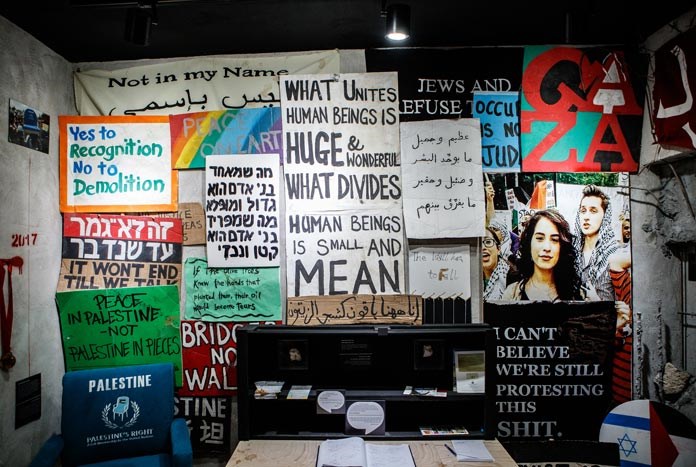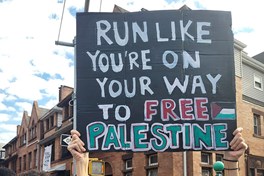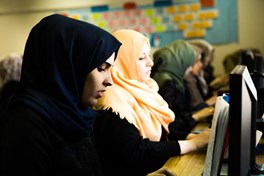Read a joint statement and complete list of civil society organisations, including trade unions, charities, NGOs, faith, climate justice and human rights groups.
Amos Trust has joined nearly 70 civil society organisations in pledging to fight the Economic Activity of Public Bodies (Overseas Matters) bill, or anti-boycott bill, as a threat to basic democratic rights.
Read the statement
The Anti-Boycott Bill:
- Aims to prevent public bodies from deciding how to spend, invest and trade ethically, in line with international law and human rights. 68 civil society organisations state that the bill will stifle a wide range of campaigns for justice, erode local democracy, and present a threat to freedom of expression.
- Singles out Israel its occupation of Palestinian territory with an immunity not afforded to any other state, preventing public bodies from being able to cut ties with illegal Israeli settlements and companies profiting from them.
- Would be the first time a piece of British law requires Israel and the territories it illegally occupies to be treated in the same way, departing from decades of British foreign policy and international consensus on the illegality of settlements.
- Follows in the wake of other government legislation which is curbing the right to protest in significant ways.
A broad coalition of groups call on the UK government to immediately halt the bill, citing concerns over democratic rights of freedom of expression and to advocate for social and climate justice.
Similar anti-boycott legislation passed by 30 states in the USA has been used as a ‘template’ model legislation to target climate justice, gun control and abortion rights movements.
Sign the petition to say NO to the anti-boycott bill
The bill singles out Israel and its occupation of Palestinian territory with an immunity not afforded to any other state, preventing public bodies from ever being able to cut ties with illegal Israeli settlements and companies profiting from them.
The groups who have come together to oppose the anti-boycott bill are concerned that the legislation will impact on the ability of public bodies to make decisions in line with ethical investment principles, and to divest from companies involved in violations of international law or human rights. It could hit campaigns against violence against children and civilians in countries where these practices are tolerated or endorsed by authorities, or deforestation and environmental destruction, unless these actions are explicitly outlawed.
The bill includes a ‘gagging clause’ restricting the freedom of public authorities to advocate for boycott or even talk about the prohibition — forbidding all those subject to the proposed new law from even stating that they would support taking a moral stance if it were permissible to do so.
Boycott and divestment campaigns have been used by movements across the world to pressure regimes, institutions, or companies to change abusive, discriminatory, or illegal practices. They have helped to end the trans-Atlantic slave trade, obtain civil rights, and champion freedom and equality.
The groups who have come together to oppose the anti-boycott bill are concerned that the legislation will impact on the ability of public bodies to make decisions in line with ethical investment principles, and to divest from companies involved in violations of international law or human rights.
The best-known boycott was the campaign to end apartheid in South Africa. Millions in this country, including many local authorities, took part in that movement and their contribution to the creation of a democratic South Africa was recognised by leaders including Nelson Mandela. Had the anti-boycott law been in place, it would have forced public bodies and British universities to do business with South African apartheid as well as other brutal and criminal regimes.
The bill is aimed primarily at the successful Boycott, Divestment, Sanctions (BDS) movement that seeks to end international support for Israel's systematic oppression of Palestinians and pressure Israel to comply with international law. BDS was called for by more than 170 Palestinian civil society groups in 2005 and has grown into an effective strategy to challenge corporate and institutional involvement in violations of Palestinian human rights.

The best-known boycott was the campaign to end apartheid in South Africa. Millions in this country, including many local authorities, took part in that movement and their contribution to the creation of a democratic South Africa was recognised by leaders including Nelson Mandela.
Palestine Solidarity Campaign
Ben Jamal, Director of Palestine Solidarity Campaign UK (PSC), says,
“The anti-boycott bill is a major attack on freedom of expression. Boycotting is a legitimate, historically recognised tactic that has been the engine of great leaps forward for social and international justice, such as the ending of apartheid in South Africa. If passed, this law will have a chilling effect on all campaigns for social and political change, by trying to remove a key tool for peaceful activism, while protecting the profit-making interests of corporations at any social and environmental cost.
No less important is the foreign policy implication: this bill could codify in British law what can only be interpreted as an attempt to change British foreign policy by the back door and undermine decades of international consensus, giving Israel the green light to intensify its illegal settlement building in the Occupied Palestinian Territory and its ongoing violations of Palestinian human rights. This would be wrong at any time, but especially at this moment when the most right-wing government in Israel’s history is pushing forward an extreme agenda of land grabs for settlement expansion and perpetrating horrific violence against the Palestinian people.
“If passed, this law will have a chilling effect on all campaigns for social and political change, by trying to remove a key tool for peaceful activism, while protecting the profit-making interests of corporations at any social and environmental cost.” Ben Jamal, Palestine Solidarity Campaign
This bill will be opposed by all who believe that public bodies should not invest money in companies responsible for violations of international law and human rights regardless of whether the Government of the day does not wish to oppose those rights violations.”
Unite The Union
Sharon Graham - General Secretary, Unite the Union says,
“This is yet another assault on workers by a government keen to suppress the right to protest. The targeting of the Local Government Pension Scheme is particularly outrageous. This is not the government’s money.
It represents the deferred wages of our members, and they have every right to say how they want it invested and to demand divestment from companies complicit in attacks on workers and communities. We strongly oppose this law and will continue in our work to defeat it.”
Friends of the Earth
Dave Timms, head of political affairs at Friends of the Earth (England, Wales and Northern Ireland) said:
"The right to boycott countries and companies that pollute our environment, that break international law or abuse human rights is essential in the fight for a greener, fairer future. Banning public bodies from using these vital tactics unless they support UK foreign policy would be a frightening and authoritarian step.
Globally, fossil fuel divestment has led to institutions with a combined value of over $40 trillion diverting their money away from polluting industries to greener alternatives. In the US, the fossil fuel lobby has used anti-boycott legislation to try and restrict climate activism - we must not let the same thing happen here."
— — — — — — —
Sign the petition
Notes:
The full Right to Boycott statement and list of signatories can be found at https://righttoboycott.org.uk. Signatories include Liberty, Unison, Unite the Union, University and College Union, Friends of the Earth, Greenpeace UK, Muslim Association of Britain, Methodist Church in Britain and Campaign Against Arms Trade.

















